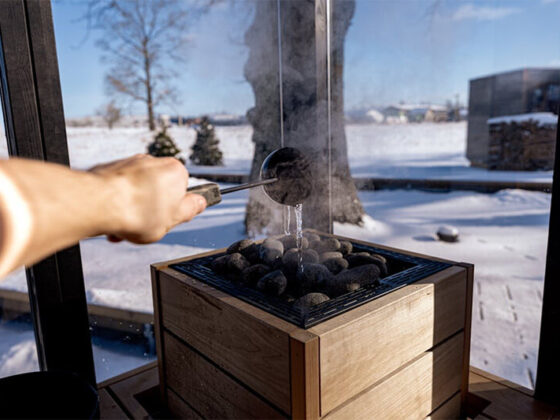For centuries, cultures around the world have turned to the enveloping warmth of the sauna as a place for relaxation, purification, and connection. While the feeling of deep calm it provides is undeniable, modern science now confirms that the benefits of regular sauna use extend far beyond simple stress relief.
This ancient practice is a powerful tool for enhancing physical and mental well-being. Here’s a look at the remarkable health benefits you can gain from making sauna a part of your wellness routine.
Key Health Benefits of Regular Sauna Use
1. Improved Cardiovascular Health The heat from a sauna provides a healthy workout for your heart. As your body temperature rises, your heart rate increases and your blood vessels dilate, improving circulation in a way that mimics moderate exercise. Long-term studies, particularly from Finland where sauna is a national pastime, have shown that frequent sauna use is linked to a significantly lower risk of high blood pressure, stroke, and fatal heart disease.
2. Powerful Stress Reduction The sauna is a sanctuary from the noise of daily life. The warm, quiet environment helps lower levels of cortisol, the body’s primary stress hormone. At the same time, the heat stimulates the release of endorphins—the body’s natural “feel-good” chemicals—leading to a profound sense of calm. In Japan’s thriving sauna culture, this blissful state of mental clarity and relaxation is known as totonou.
3. Pain Relief and Muscle Recovery The heat of a sauna is highly effective for soothing aches and pains. Increased blood flow delivers more oxygen to tired or sore muscles, accelerating the recovery process and reducing inflammation. This makes the sauna an excellent tool for athletes looking to reduce muscle soreness after a workout, as well as for individuals dealing with chronic pain conditions like arthritis or fibromyalgia.
4. Deeper, More Restful Sleep Many people report a significant improvement in their sleep quality after using a sauna. This is largely due to the body’s temperature regulation. The increase in body temperature during the sauna is followed by a gradual cool-down period afterward. This drop in temperature is a key physiological signal that tells the brain it’s time to prepare for deep sleep.
5. Skin Cleansing and Rejuvenation Deep sweating is one of the most effective ways to cleanse your skin from the inside out. As you sweat, your pores open up, flushing out impurities, dirt, and bacteria. The enhanced circulation also delivers more nutrients to your skin cells, which can help improve skin tone and elasticity over time, leaving you with a healthy glow.
6. A Stronger, More Resilient System The practice of alternating between the heat of the sauna and a cold plunge or cool shower is more than just invigorating—it’s a form of training for your body’s autonomic nervous system. This process helps your body become more resilient and better at adapting to different environmental stressors. Some research also suggests this mild heat stress can stimulate the immune system.
How to Sauna Safely for Maximum Benefit
To enjoy these benefits, it’s important to practice sauna bathing correctly and safely.
- Hydrate Well: Drink plenty of water before, during, and after your sauna session to replace fluids lost through sweat.
- Listen to Your Body: If you are new to sauna, start with shorter sessions of 5-10 minutes. Gradually increase the duration as you become more comfortable, but avoid staying in for longer than 15-20 minutes at a time.
- Embrace the Cycle: For the full effect, follow the cycle of heat with a proper cool-down. This can be a cool shower, a cold plunge, or simply resting at room temperature. Repeat the cycle 2-3 times.
- Avoid Alcohol: Never consume alcohol before or during a sauna. It increases dehydration and can lead to dangerous drops in blood pressure and impaired judgment.
Disclaimer: While saunas are beneficial for most people, it’s always best to consult with a doctor before beginning a sauna routine if you are pregnant or have a serious health condition, such as unstable heart disease or very low blood pressure.




